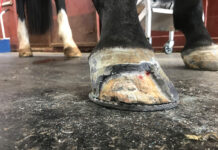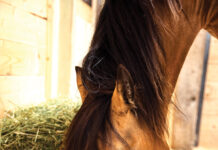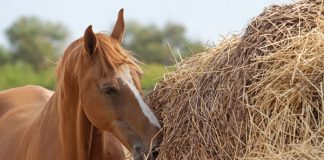
Q: My horse always seems to act like a stallion. He’s mouthy, acts aggressive and dominates the other horses, and the mares go into heat for him. However, there are no testicles showing, he’s never bred a mare, and he was supposed to be gelded as a yearling shortly before I got him; he’s now 5 and has been like this the whole time. What’s going on?
It’s not uncommon for colts to be born with one or both testicles still in the abdominal cavity. Over time, they should descend into the scrotum by a gradual, natural contraction of a ligament in the groin. On average, if a colt’s testicles have not descended by about the age of 2, then he’s considered a cryptorchid.
Cryptorchids should always be castrated. A retained testicle is usually infertile, since the normal body temperature is too warm for the development of healthy sperm. However, the testicle will still produce testosterone and thus result in stallion-like behavior. Additionally, retained testicles are at a higher risk of developing tumors.
Retained testicles can be in three locations, the simplest being just above the scrotum. These are referred to as “high flankers.” If this is the case, the testicle can usually be palpated and removed on the farm. The other two possible locations are farther up: in the area called the inguinal canal (between the scrotum and the abdominal cavity), or in the abdominal cavity. These cases require more extensive surgery and would need to be referred to a clinic.
It’s more common for a single testicle to be retained. Both the left and right testicles are equally likely to be affected, but studies show that if the left is retained, it’s more likely to be located in the abdomen. The cause of cryptorchidism in horses is complex; it’s not completely understood, though genetics is suspected to play some part.
Assuming you don’t have veterinary records that show your horse has been castrated, your veterinarian could draw blood for laboratory analysis of testosterone levels, which will generally be lower in geldings than in cryptorchids. If your horse has a retained testicle, removing it should resolve the testosterone-fueled behavior.
If your vet rules out cryptorchidism, then your horse’s mouthy, aggressive and dominating behavior around other horses could be as simple as your horse attempting to become, or remain, at the top of the pecking order. After working with your veterinarian to rule out any other health conditions that may be causing your horse pain, I strongly recommend you work with an experienced trainer on behavior modification for your horse.
Liked this article? Here are others you’ll enjoy:
Hormones and Horse Behavior
When Horses Act Dangerously
A Guide to Gelding
This article originally appeared in the October 2013 issue of Horse Illustrated magazine. Click here to subscribe!






My 2 yr old young stallion, never dropped, and what started out as a normal gelding turned into major surgery, because neither testicle was normal, nor in the correct place, and not together either.
great info
Yep that is my 4 year old. Went to vet school and had surgery. Testicle in abdomen. Supposedly was gelded. Now he is awesome!! Immediately behavior was improved with No biting!!!!